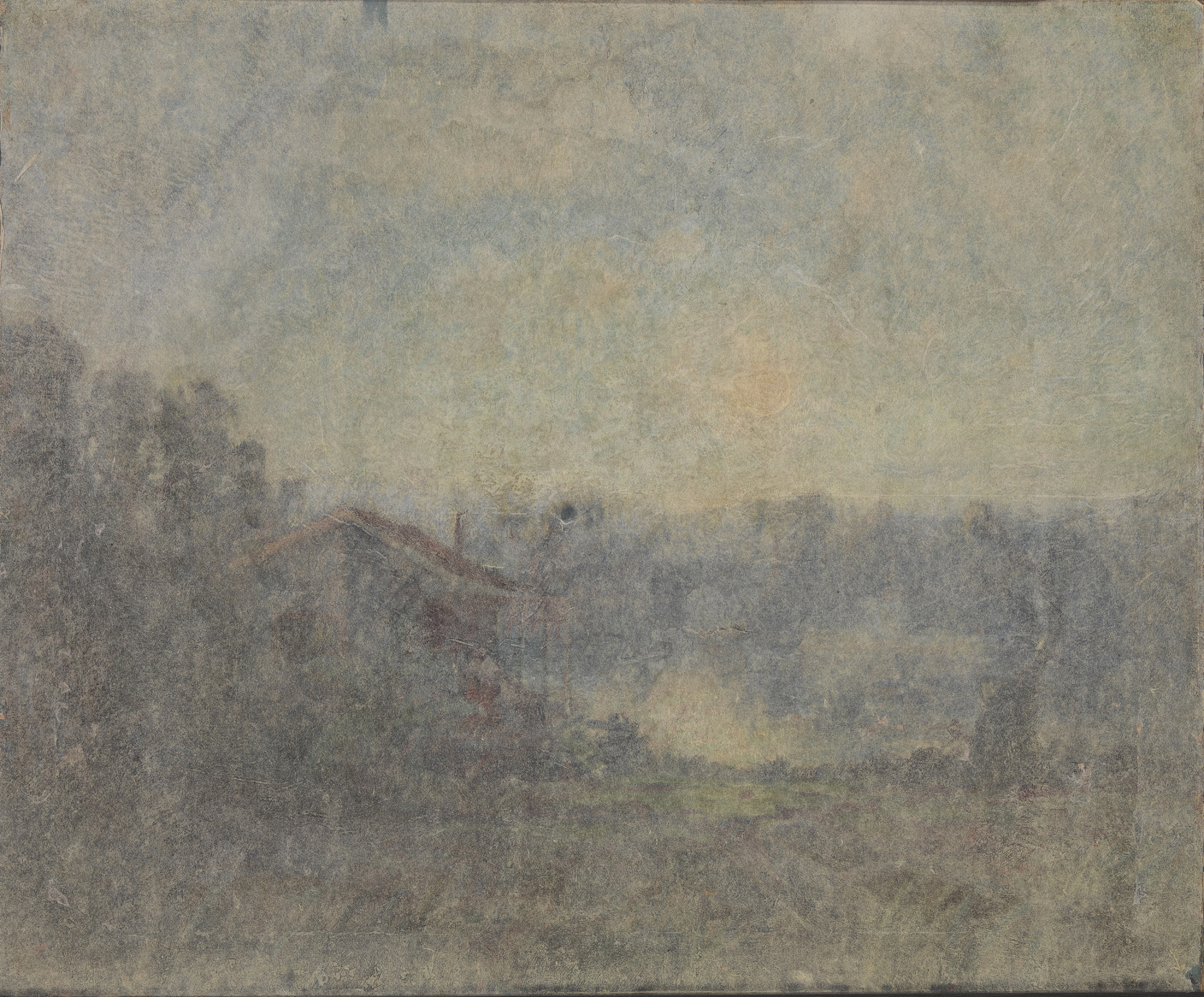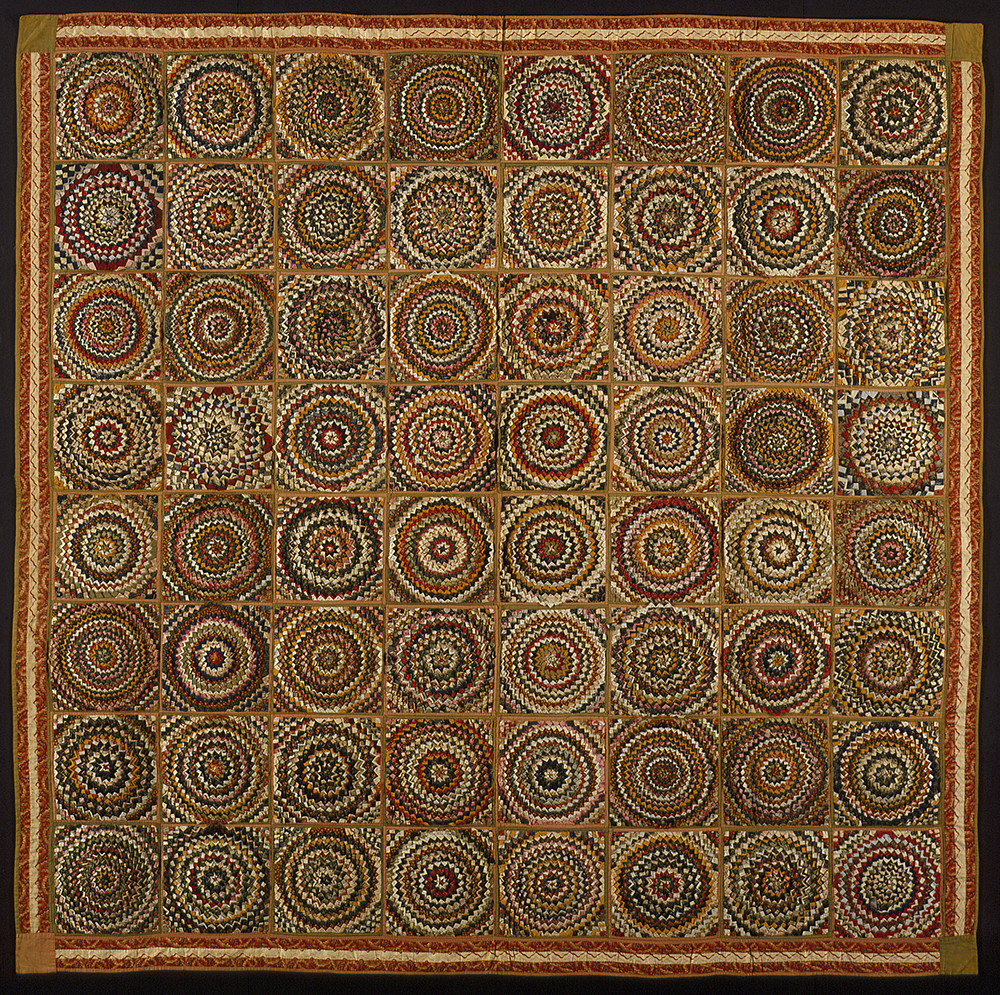
Evening Louisiana, by Knute Heldner, 1936. Smithsonian American Art Museum, Transfer from The Receiving Home for Children, Department of Public Welfare, Washington, DC, 1967.
In August 1753 rumor began to circulate around Mobile, capital of the Louisiana Territory, that a French soldier, André Baron, had committed the crime of bestiality with a mare. François-Xavier, an enslaved African and the sole eyewitness, had stumbled on the soldier in the act, having first watched perplexed as the soldier led the mare into a hut and tied her up before climbing up behind the animal with his breeches undone. Word had got around town because, while François-Xavier had been so “seized with horror at such an act” that he “wanted at first to throw himself on [Baron],” the slave did not, in fact, confront the soldier at the time but instead “slipped away very quietly” and went on to tell a slew of people about what he had seen. He told a passerby and his master immediately. Several days later, as the news spread through Mobile, Baron sought out François-Xavier to get him to reassure the other soldiers that he was innocent of the crime. The enslaved man, however, related once again, directly to the soldiers this time, what he had seen: Baron poised on stakes behind the mare with his breeches undone. Shortly after François-Xavier denounced him in front of his peers, Baron fled, was captured on neighboring Dauphine Island, and then prosecuted, thanks to the deposition that François-Xavier provided.
In this highly unusual court case, François-Xavier provided his audience with a window into his immediate reaction to Baron’s act. François-Xavier’s actions—or, especially, lack thereof—signal how he made sense of his world and his place within it and, especially, how well he understood the limits imposed on his person because of his status as a slave. By stepping away from the specific allegation against Baron and parsing what François-Xavier tried to convey about his demeaning day-to-day experiences of enslavement, it is possible to recognize how testimony served as a form of autobiographical expression. Clearly this is not autobiography in the strict sense of a literary narrative arc of one lifespan, but it is nevertheless intrinsically personal. Spoken in the moment, often in mere slivers, testimony like François-Xavier’s reminds us to consider how—and why—some enslaved individuals spoke, often so candidly, about themselves. Each of the various Frenchmen who testified, evaluated the slave’s account, or judged the court case acknowledged François-Xavier’s role in shaping the narrative. They did so even though his status as an enslaved man would be incessantly invoked as reason enough to discount his word. As for François-Xavier himself, his words reveal how tenaciously he strove to keep the focus on his own humanity, his character, and his honor.
Whether telling his story in the community or in the courtroom, François-Xavier insisted on expressing himself, on conveying—repeatedly—how strongly he had reacted to what he characterized as a horrific act. He did not limit himself to describing but persisted in passing judgment. At every opportunity, he brought up the sight of Baron with his “breeches lowered and in the act.” Seizing the moral high ground, he not only testified about Baron’s crime in court, but he also informed the court that he had recounted what he had seen to a whole series of colonists: starting with a bystander, Conrad Leideck, then his master, Pierre Ignace Bardet Laferme. These two individuals testified, and each corroborated that he had talked to them about the incident. Finally, he told his story to a group of soldiers, which they, too, would corroborate. No doubt he told others.
Once he began testifying in court, François-Xavier went further in emphasizing the moral gulf that separated him from Baron by asserting that he had refused Baron’s attempt to buy his silence. François-Xavier gave very precise details of that exchange, stating that the accused had come to find him and said to him, “Here my friend, if you want to not tell I will give you one piastre that I earned from Mr. Blouin for eight days’ work for him.” That particular sentence was underlined in the trial record. Baron did not deny offering money but explained that the money was to pay François-Xavier for a “cure,” which had failed. Under interrogation during the sellette (a special interrogation conducted in the prison so named for the low stool on which the defendant was made to sit), Baron added that “he had told the said negre that he would never give him anything because he had not cured him.” Baron never did explain what the cure was for or what the treatment consisted of. François-Xavier’s master was the royal surgeon at Mobile, and, perhaps he had received training in French medical techniques or brought his own knowledge of healing practices to his work. It is also conceivable, given the circumstances, that François-Xavier had offered to cure the soldier not of a physical problem but one of a sexual nature.

François-Xavier told the court that he had in fact rejected the bribe because the crime was “too atrocious.” Yet he seems to have continued to interact with Baron because the two men appeared together to address the soldiers. According to François-Xavier’s detailed account, “The following Friday, word having spread of this act, and the soldiers who were [Baron’s] friends having reproached him on the subject, the said Baron had come to find the deponent at his master’s to beg him to come to the fort to tell his friends that he had only seen him pull horsehair from the tail of the said mare and that he would give him a piastre from his ration.” François-Xavier stated in court that he “did not want to promise to do that,” however Baron must have been sufficiently reassured, since the two walked together to the fort and to the barracks where a large number of soldiers had assembled to hear the slave speak. But, instead of repudiating his initial accusation, François-Xavier described, before this new audience, Baron’s act with the mare once again. It was at that point that Baron jumped out the window of the barracks, scaled the fortifications of Fort Condé, and ran away because, he later said, “all his friends were against him.” Baron was captured on Dauphine Island, about three miles by sea from Mobile. The soldiers found him drying his wet clothes on some vegetation, in other words only partly dressed; no explanation was given as to how he got there. On being captured, Baron, fearing that he would be burned at the stake if brought back to Mobile, begged the guards to kill him on the spot rather than arrest him. These men were brought in to testify; all but one stated that they had interpreted this statement as an admission of guilt. Baron denied this was the case.
No information was provided in the court record about François-Xavier beyond the fact that his master was the royal surgeon. As for the twenty-six- or twenty-seven-year-old Baron, he was a native of Dauphiné in southeastern France who had arrived in Louisiana three years earlier to serve in the Swiss troops. Twice interrogated, the second time on the sellette, he was sentenced to interrogation under judicial torture. Since Mobile lacked an executioner-torturer, he was remanded to prison in New Orleans. There the Superior Council evaluated the documents sent from Mobile and completed its own investigation, making one change in that the bystander Leideck was now named the first witness and François-Xavier the second.
François-Xavier was surely aware as the trial proceeded that, according to French law, Baron could be sentenced to death for a crime he himself found “atrocious.” Nevertheless, on October 5, 1753, the Superior Council pronounced its verdict and convicted Baron to a sentence of “more amply informed,” with the proviso that, during the intervening year before the matter was reconsidered, Baron would remain in prison. This was a standard sentencing option, pronounced when the facts were not clear or when it was deemed that there was not enough proof to absolve or condemn. The accused was either released, or remanded to jail for a specified period, but could eventually be handed a new sentence, even the death penalty. Baron seems to have evaded the death penalty. He was in all likelihood made to resume his duties (and labor) as a soldier for France as soon as he was freed.
Criminal procedure allowed defendants to state if they rejected a witness (for example, if they believed them to be biased). Baron only did so for François-Xavier, saying that “he has nothing to say against the French who made depositions against him, only against the negre, who is a rogue and a wretch who wants to do him harm.”
As we read the voluminous records that this court case generated, we need to pause and move past the circumstances of the trial, past the sensationalism and scandal of an accusation of bestiality. André Baron’s anguished explanation that he had fled because “all his friends were against him” evokes his despair and goes to the heart of what was, in the end, the real issue for him. Though his condition was in every respect superior to that of a slave, here was a scared, troubled young man, probably conscripted or otherwise pressed into service, garrisoned with other soldiers, far from home, with few prospects of returning to France and his native Dauphiné anytime soon. No matter the disturbing circumstances that brought him to court to testify, he, too, is worthy of being heard.
As for François-Xavier, from a legal standpoint, his declarations of outrage were irrelevant. But if we follow his lead, we can understand more fully what was at stake for him as we imagine the spectrum of emotions that he must have felt in the moment and as he made repeated attempts to be heard, believed, and trusted. The slave had begun his deposition by stating that, “seized with horror at such an act, [he] wanted to throw himself on [Baron] but that, since he could not do this, he slipped away very quietly.” He ended his deposition by declaring that “if [Baron] had been a slave, he would have stopped him.”
François-Xavier held the moral high ground but he was powerlessness to act simply because he was a slave and the soldier was not. Instead, he offered a damning intellectual critique of slavery, one that he could not verbalize in court but that hung in the silence. The trials from colonial Louisiana are full of such moments when words and silences work not in isolation or in tension but together. There is no ideal or complete archive, nor do we have the luxury to imagine one. Instead, why not let our guard down, shake ourselves free from assumptions, rethink received wisdom—for example, about what constitutes a slave narrative or what determines the gold standard for autobiography—and allow ourselves to bumble along, immersing ourselves deeper and wider until we see, and hear, in sometimes new and unexpected ways, what was always there in the silences and words.
The records of trials in which the enslaved testify are far from perfect, and their voices are not perfectly free, yet this archive affords us access to a space where the enslaved narrated their own stories, with immediacy, with urgency. Here were real people who lived full lives. We are the richer for having encountered them, however fleetingly. And whenever they did have the opportunity to speak and have their words recorded, we surely owe it to them to listen and to try to hear.
From Voices of the Enslaved: Love, Labor, and Longing in French Louisiana by Sophie White. Copyright © 2019 by the Omohundro Institute of Early American History and Culture. Used by permission of the University of North Carolina Press.
